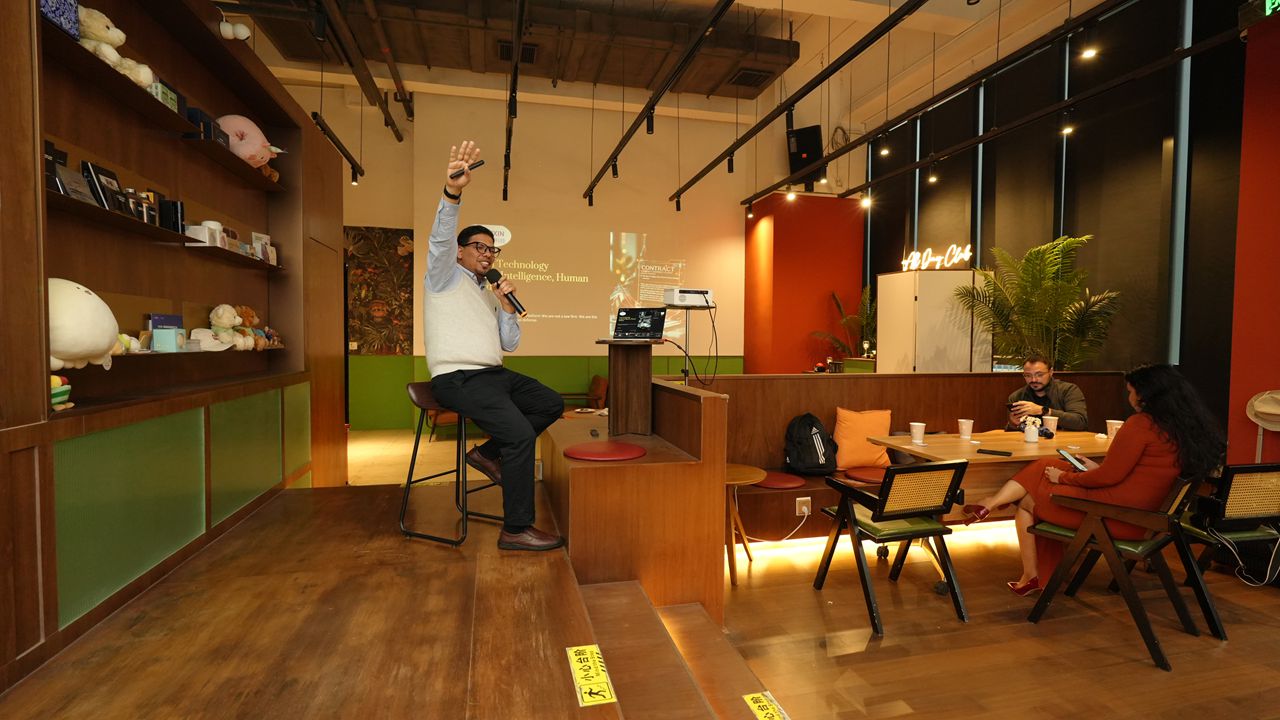Egyptian entrepreneur builds AI legal platform
Writer: Chang Zhipeng | Editor: Qianyu Liu | From: Original | Updated: 2025-10-20
Video by Xu Shuntian
Frustrated after paying 2,000 yuan (US$280) last year for legal advice that proved neither useful nor reliable, Egyptian entrepreneur Mahmoud Hamdy decided to rethink how people access legal help. Currently, he leads an AI-driven platform that offers smarter, faster, and far more affordable legal assistance for both foreigners and locals in China.
Hamdy's China story began in 2017. He worked as a trader, exporting batteries, phones, and auto parts to Egypt, Canada, and Mexico, then studied Chinese language at Jinan University Guangzhou. In 2021, he earned a master's degree from East China Normal University in Shanghai, where he specialized in education management and leadership policy.

Mahmoud Hamdy. Photo by Chang Zhipeng
After graduation, Hamdy obtained a Startup Visa from the Shanghai government, but limited funding made it difficult to continue there. Seeking a more dynamic ecosystem, he moved to Shenzhen, where he began teaching courses in international perspective and management while developing his interest in technology and innovation.
When he set out to establish his own trading company, his visa status left him unsure about the legal procedures. The lawyers he consulted only deepened that frustration: many lacked English proficiency, focused on unrelated specialties, or gave outdated information.
"I met two lawyers about international trade," Hamdy recalls. "But they specialized in family and IP law and suggested other firms. Sometimes I'd study the newly revised law myself, only to find the lawyer still quoting the old version."
He also suspected that his personal information had been mishandled after making inquiries. He was soon inundated with marketing calls from agents and office-rental companies, hinting at a data leak.

Mahmoud Hamdy shares at an international story sharing event in Qianhai this August. Photo by Zhen Jianhong
Those setbacks inspired Hamdy to build a better solution. Through disciplined self-study and by combining ChatGPT with proprietary AI models, he built a system trained exclusively on Chinese law. In February this year, he registered Shenzhen Lvxin Fazhi Technology in Qianhai. The company's mission is to demystify Chinese law and make reliable legal guidance accessible to everyone.
The platform available at www.lvxlaw.com currently provides two core functions: AI legal information and contract risk analysis.
Users first describe their situation and write their questions. The system then analyzes the input and provides direct references to relevant legal provisions and specific articles in Chinese law. Uploaded contracts are automatically scanned for potential risks, categorized as low, medium, or high, and accompanied by AI-generated insights and suggested revisions
Privacy and compliance anchor the system's design. Clients can connect via Lvxin's API and store their records on their own servers, ensuring full control of sensitive data and compliance with China's Data Security Law and Personal Information Protection Law.

Mahmoud Hamdy shares at an entrepreneurship salon in Qianhai this April. Photo by Zhen Jianhong
The pricing model is intentionally affordable: users can pay 200 yuan for a month of access or 20 yuan per session, each session supporting up to 15,000 characters of input.
Trained entirely on Chinese legislation, the system supports six languages with plans to expand to eight. "Our goal is simple," Hamdy says. "We want to make Chinese law understandable and accessible to everyone — both locals and foreigners."
He credits Qianhai for providing an ideal base. "It connects China with the world. The ecosystem, policies, and international mix here give startups like ours real momentum," he says.

Mahmoud Hamdy sings at music night held in Qianhai last year. Photo by Lin Songtao
To foster collaboration and community, Hamdy also founded the Shenzhen Business Leaders Club, an online network of over 100 entrepreneurs, and hosts weekly meetups that bring together investors, founders, and professionals from diverse industries. "Many people I met through the club became our clients and they used our platform to solve real legal problems," he adds.
The platform has already attracted early users among startups, SMEs, and foreign residents in China seeking faster, language-friendly legal support. As China's commercial landscape grows more global, Hamdy's AI platform stands at the intersection of law, technology, and international business, promising accessible, data-driven legal clarity for anyone navigating China's complex legal environment.